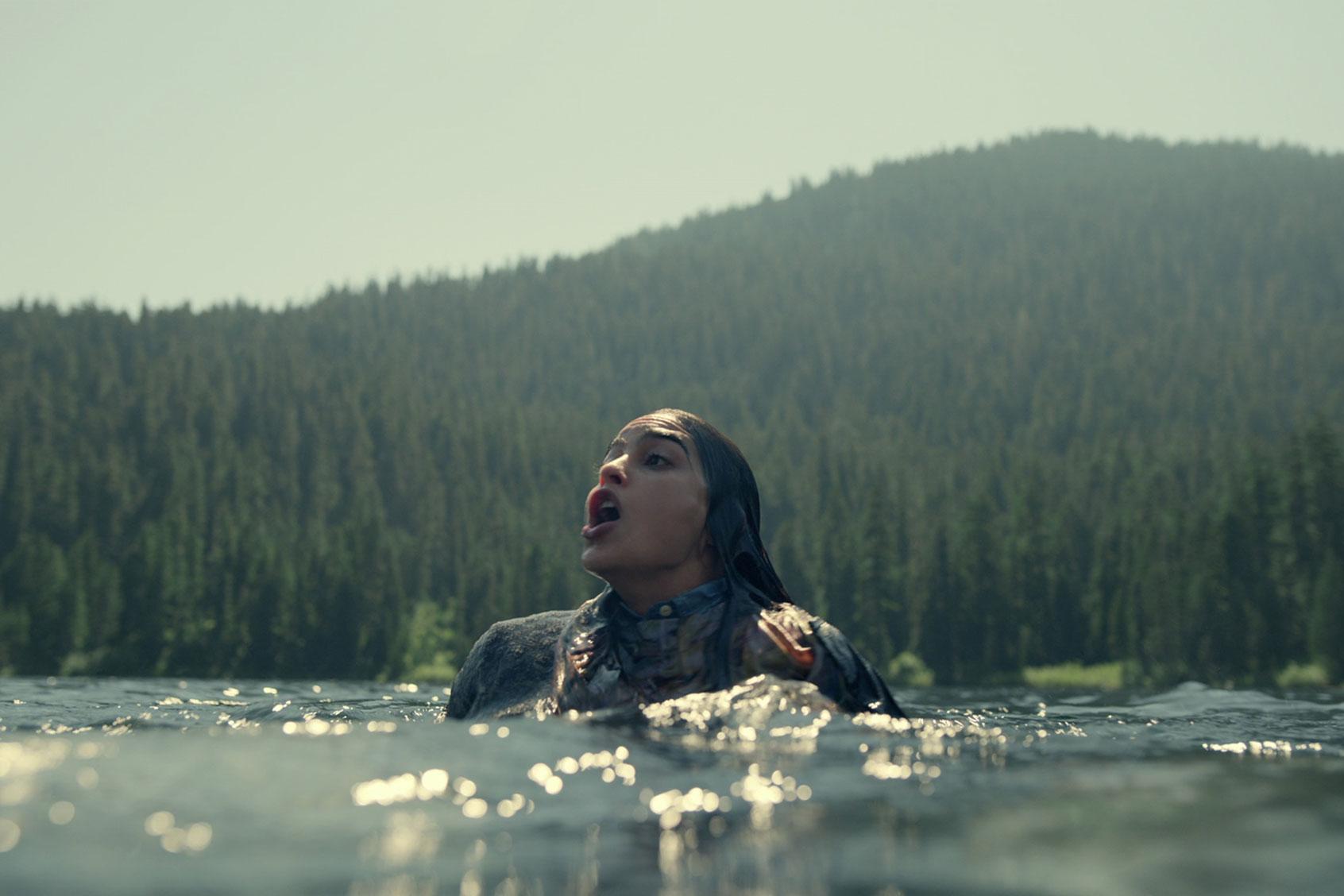In “Keep Breathing,” Netflix’s new, limited series, a young lawyer named Liv does the impossible. After her small plane crashes in the remote wilderness, she endures the elements alone, with no food and little water. This is not your typical survivalist drama. Gorgeously shot in Canada’s Northern Territories, the wilderness is another character in the story, given the rich treatment of a nature documentary.
But along with saturated trees and stunning waterfalls, the show combines tense physical action with intense emotions. We spend half the time with Liv (Melissa Barrera of “Vida” and “In the Heights”) and half in her memories, in flashbacks of the difficult life that led her to unexpectedly board that plane. And Liv is not your typical survivalist. She’s a city dweller, not a Girl Scout, not even a Yellowjacket. The audience learns along with her: how to make it here.
The “Keep Breathing” creators/showrunners Martin Gero and Brendan Gall have done the impossible too. Their show, only six episodes long, crash-landed into the Netflix Top 10, debuting at No. 2 before dethroning the streaming service’s champion, “Virgin River,” to become No.1. While, the soapy Northern California show is back on top again, “Keep Breathing,” despite varying reactions, is still the little show that could, attracting over 48 million viewing hours in one week, something Gero says, “In our wildest dreams, we didn’t think this would happen . . . It was a joyful process to make it, and so that was success enough.”
But Gero describes the show as, despite its heart-pounding action, “very pleasing to watch . . . it does have that meditative, restorative feel.” He also gives huge credit to the show’s star: Melissa Barrera. “No one else could do this role . . . She Tom Cruised the f**k out of this thing. She did everything herself. She did the cold water training. She learned how to scuba dive. It’s always her . . . The connection the audience is making with her is so intimate.”
Liv has gone into the wilderness for a reason, and we the audience stay with her for some very real reasons too. Gero and Gall spoke to Salon about the show’s surprising appeal, the making of the rugged tricks Liv uses in the wild and the ending of “Keep Breathing,” which viewers can’t seem to agree on.
This interview has been lightly edited for clarity and condensed.
What inspired the story of “Keep Breathing”?
Martin Gero: Brendan and I were working on the show called “Blindspot,” which is kind of the opposite in some ways. It’s just very loud and big. We left a mix from “Blindspot” that was so loud, and we started thinking, “What is the quietest show we could make?” We’re both from Canada, so could we make a show that feels like a retreat to the Canadian wilderness? That would still have urgency and stakes, but something that could feel meditative and even restorative? We just started thinking about that and what that would mean.
And Liv is such a wonderful character. She’s complex, but likable. How did you create her? What inspired her?
Brendan Gall: Originally, our intention was to keep Liv in the present and not see any of her backstory, and only get the tiniest little slivers of who this person was through what she brought with her and the few things she would say to herself. We truly pictured it being a very, very silent story in a lot of ways. Then all these other things started to emerge as we craved them, essentially. We craved finding out who she was, and where she came from, and what brought her to this place. And we craved dialogue.
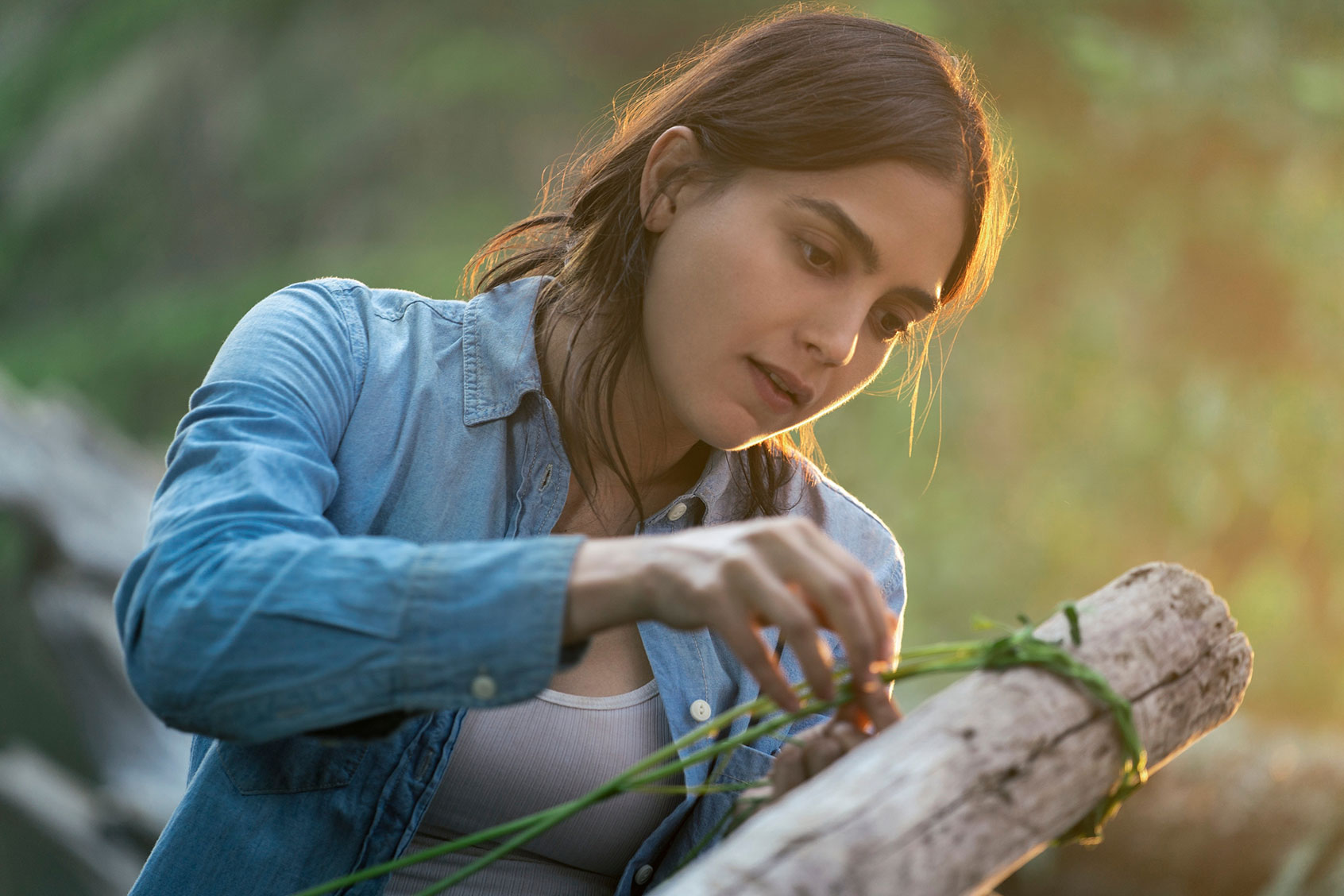 Melissa Barrera as Liv in “Keep Breathing” (Ricardo Hubbs/Netflix)So much of the show is Liv, just her alone, figuring out tasks, putting one foot in front of the other. But we wanted to hear her talking and yelling with people in the woods. And then also, autobiography creeps in against your will. I think in this case, maybe, we had the bones of the story in the present pretty clear in our head. And when we suddenly decided to blow it up into this nonlinear backstory that would unfold and bloom through the six episodes, we just started going by feel.
Melissa Barrera as Liv in “Keep Breathing” (Ricardo Hubbs/Netflix)So much of the show is Liv, just her alone, figuring out tasks, putting one foot in front of the other. But we wanted to hear her talking and yelling with people in the woods. And then also, autobiography creeps in against your will. I think in this case, maybe, we had the bones of the story in the present pretty clear in our head. And when we suddenly decided to blow it up into this nonlinear backstory that would unfold and bloom through the six episodes, we just started going by feel.
“Our rule was no Googling.”
We found moments that felt like, “Oh, that would be an amazing scene.” Like a breakup scene would be such an incredible thing to see all of a sudden in the heart of this survival drama . . . That in some ways feels higher stakes than the life and death stuff happening out in the woods. Then walking backwards from there, and being like, “Well, why did she break up with this guy? He seems like such a nice guy . . . what kind of a person would have so much armor that they didn’t feel safe giving and receiving love from someone who is standing right in front of them?”
You walk yourself backwards, and you go, “Well, how did she grow up?'”And we loved this idea of a kid who was born of chaos, of love and passion, but also not knowing and fear. With Liv’s case, you’d build a life around certainty, and black and white, and being the smartest person in the room. Then dropping her in the woods . . . She’s suddenly not an expert. And it’s also scary because she has to sit in silence and stillness and reconcile all these demons that she’s put away for so long.
It brings her back to her core. She doesn’t have anything except her thoughts and her memories. That’s really interesting that you say that, because the show is so emotional, and you don’t expect that from a show about wilderness survival. But it is a lot about feelings.
Gero: It’s a survival drama on the outside, but inside, it’s about dealing with trauma and becoming more vulnerable.
I know that you’re both Canadian. I’m sure you’ve probably been asked this before, but do you have much experience with wilderness survival, or camping, or anything like that?
Gero: My mother used to drag me along what’s called the Bruce Trail, which is sort of like the Appalachian Trail. It’s endless. As a kid, I didn’t understand that. So, we would go on these road trips across Canada in our little Honda Civic, and we would stop, two days with packs, and we’d stop. And again, it would be the f**king Bruce Trail. And I was like, “I don’t understand. This goes forever. It’s like mobius strip or something.” But that was as close as I got was some camping trips with my parents, separately.
Gall: Certainly, never a situation where it was life or death. That was the fun for Martin and me. We were putting ourselves in Liv’s shoes, which was from the position of an amateur, of: you don’t go in knowing how to make drinking water out of condensation. We had all these people being like, “Well, you know how she should get water?” And we said, “Well, you know that, because you like hanging out in the woods!”
Right. But would she know that?
Gall: We don’t know that. And so, if we don’t know it, she can’t know it.
Gero: Our rule was no Googling . . . We already had the advantage that we were two against one. There were two of us trying to come up with these solutions. Some of our solutions are dumb because we’re not survivalists. And that was an important rule. The only cheat is I remembered that you could make a compass from a needle and like a cork. But I made the mistake that she did, which I forgot about the magnetizing.
So, how did you come up with these survival strategies? Were you just brainstorming without Google? Or drawing from survival stuff you already knew?
Gero: It was just straight up brainstorming . . . For instance, the berries, there were probably some berries there, but most of them are probably poisonous. So, what do you do? You wash them, you sort them, you eat some, and you wait. And if you don’t throw up, then you’re good. And that’s what she does . . .The funniest one was, there’s no reason for Liv to have two fires. She eventually boils this thing and tries to touch it and it hurts. And then she’s like, “Oh, OK. I’ll start another fire. And then I’ll put this fire out.” Whereas, she could have just found some sticks or something –
Or used the sleeve of her sweater to hold the hot container.
Gero: But in the brain fog of that exhaustion and that thirst, she doesn’t make all of the best choices.
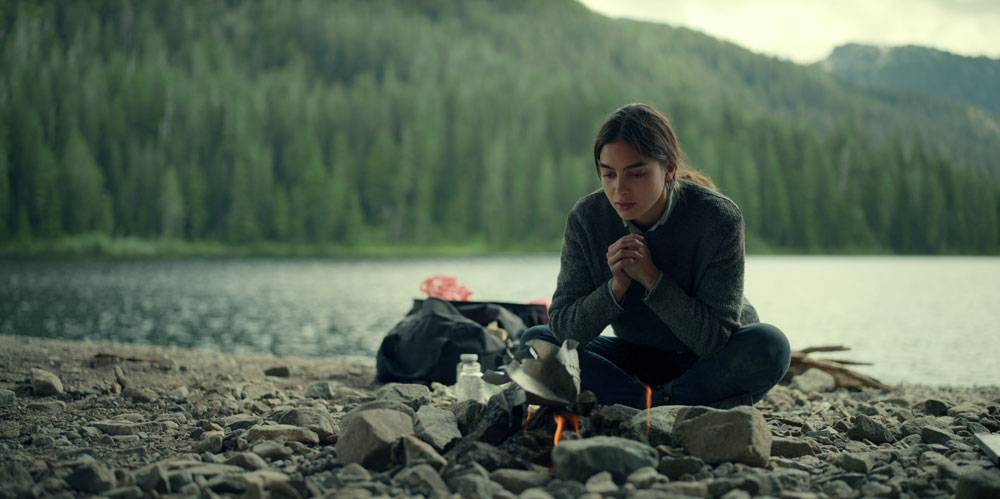 Melissa Barrera as Liv in “Keep Breathing” (Courtesy of Netflix)Gall: Which again, is, I think, what’s interesting, is you have a character who is truly a force to be reckoned with in her field. As a corporate lawyer, she’s a force of nature, she’s a shark. But she’s not in her field and she’s not working at her best. She’s starving, she’s thirsty, she’s exhausted. She’s cold, she’s scared. And we don’t make our best decisions in those states. Part of the fun is how she fumbled through those moments.
Melissa Barrera as Liv in “Keep Breathing” (Courtesy of Netflix)Gall: Which again, is, I think, what’s interesting, is you have a character who is truly a force to be reckoned with in her field. As a corporate lawyer, she’s a force of nature, she’s a shark. But she’s not in her field and she’s not working at her best. She’s starving, she’s thirsty, she’s exhausted. She’s cold, she’s scared. And we don’t make our best decisions in those states. Part of the fun is how she fumbled through those moments.
That’s good to see too, because so many shows that have these dire, intense survival situations, people all of a sudden become really good at all that stuff instantly, in the moment. They know how to do everything. They’re like MacGyver or something. It’s nice that she isn’t, that she doesn’t know.
Gall: You see a progression. And I think there’s a satisfaction in the way that, as a kid, I felt satisfied when I figured out how to build a fire finally. And it is nice to feel that you’re moving forward in that. But it’s slow, and there are so many stumbling blocks. It’s incremental.
“I finally just asked a really dumb question, which is, ‘Can we just crash a real plane?'”
Gero: It’s funny for us, just talking to people about being stuck in the woods and seeing the reaction of the show. Obviously, the thing that does scare people the most is not just the survival thing, but it’s being alone with your thoughts. That’s kind of amazing that it’s a top fear of being stranded. I think the show really speaks to that aspect of it, of: we’re able to busy our mind as much as we want in the modern world. It allows us to not really deal with how we’re feeling if we don’t want to. This is really the story of someone who has been able to not deal with all of her trauma until she finally gets that silence in the woods.
How did you do the plane crash? Which is quite terrifying.
Gero: We shot all of this for real out in the woods. We were like, “We can’t just suddenly have this CG plane. We don’t have a Marvel budget for this. It’s not going to look great.” And then we started talking about miniatures. Can we crash a miniature? But because it has to crash into the water, the water would scale wrong. The water splash would look weird. Then I finally just asked a really dumb question, which is, “Can we just crash a real plane?”
And they said, yes, that we could crash a real plane.
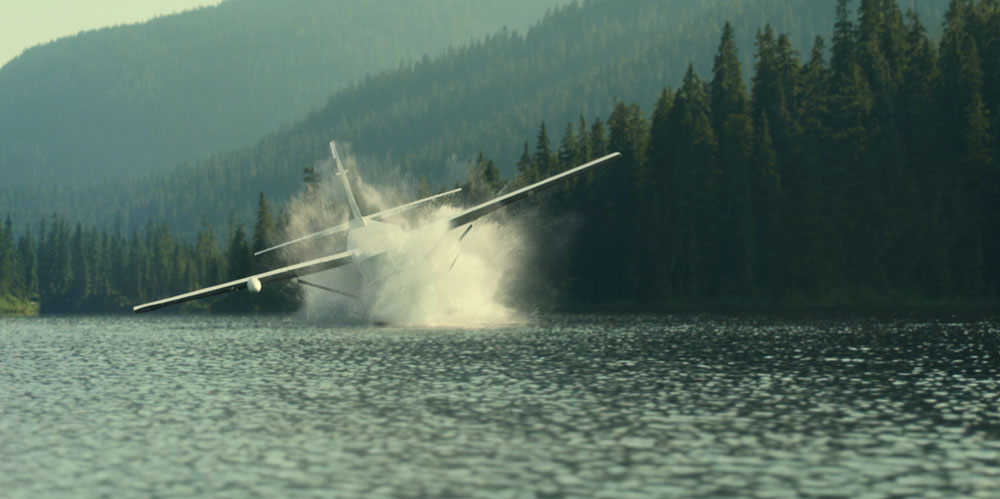 Keep Breathing (Courtesy of Netflix)We figured it out with an incredible team. We had to buy a plane anyway to use in all the underwater stuff. We bought this old plane that didn’t work. We gutted it so it was clean, it wasn’t going to leak oil or any sort of bad stuff into this beautiful river. We basically put it on a zip line, just a massive zip line. The plane, once you let it go, would just slowly build up speed and then crash right into the water.
Keep Breathing (Courtesy of Netflix)We figured it out with an incredible team. We had to buy a plane anyway to use in all the underwater stuff. We bought this old plane that didn’t work. We gutted it so it was clean, it wasn’t going to leak oil or any sort of bad stuff into this beautiful river. We basically put it on a zip line, just a massive zip line. The plane, once you let it go, would just slowly build up speed and then crash right into the water.
Did you crash it more than once?
Gall: We didn’t know if we would get a second take. We did not know really what the impact of the water would do to the plane or to the clothesline that it was zipping along. And luckily enough, we did get a second take. But it was pretty terrifying and amazing.
Gero: It was a seven-camera day.
There have been recent, popular shows lately, “Yellowjackets” and “The Wilds,” which are also about plane crashes and survival in the wilderness. Do you think we’re obsessed with survival in extreme situations at the moment?
Gero: I mean, it feels like it’s really hard to survive right now just in regular life. It constantly feels like we’re under attack one way or another. So, I think people are gravitating toward this genre because it’s just a cleaner, oddly lower-stakes version of what we’re all going through subconsciously.
Gall: I also think a lot of people have been stuck in their homes. Some people are lucky enough to have places that they can escape to that are in the natural world, a place that’s more untouched. But lots of people don’t have access to that. There is possibly a craving to escape whatever they’re going through, whatever their situation is, to something that feels simpler. Even if it’s scary, it’s scary in a way that would be a complete departure from the problems you have in your own particular life.
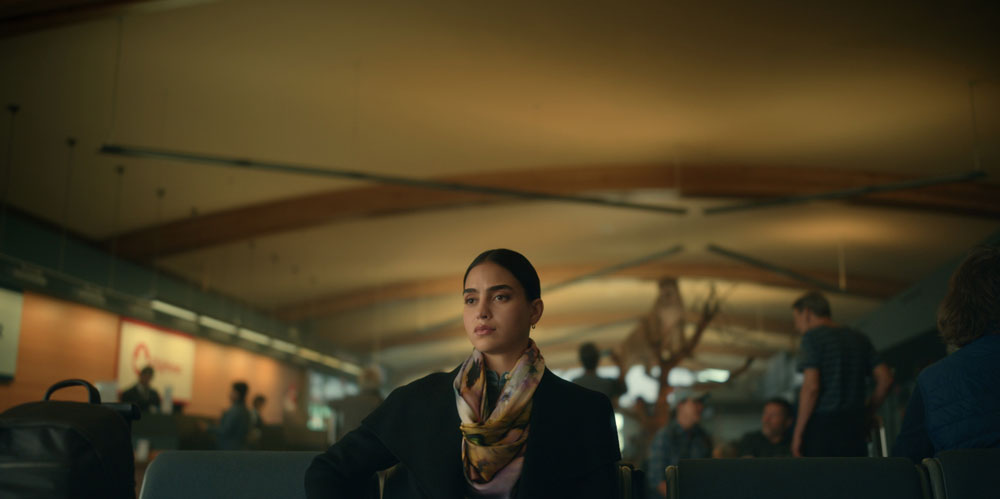 Melissa Barrera as Liv in “Keep Breathing” (Courtesy of Netflix)That’s certainly the case with Liv. She’s got no shortage of problems in her life, but suddenly, they’re all dwarfed by these very immediate things that she needs to do to not die. Her stuff goes from this philosophical existential crisis to this literal crisis of existence. I think in some ways, people want to have their lives eclipsed sometimes, or would love to have their lives eclipsed by something bigger than what they’re going through, just to give them a second to deal with something else.
Melissa Barrera as Liv in “Keep Breathing” (Courtesy of Netflix)That’s certainly the case with Liv. She’s got no shortage of problems in her life, but suddenly, they’re all dwarfed by these very immediate things that she needs to do to not die. Her stuff goes from this philosophical existential crisis to this literal crisis of existence. I think in some ways, people want to have their lives eclipsed sometimes, or would love to have their lives eclipsed by something bigger than what they’re going through, just to give them a second to deal with something else.
One of my favorite parts of the show was when the guided meditation app comes back in. And the irony of picturing this beautiful, relaxing place, and she’s in it, and it’s killing her. That is my favorite part, I think, of the whole show. How did you come up with that meditation and decide to use it in that way?
Gall: I really love Terrence Malick. And I think his relationship to the natural world and to nature in really dark, violent stories is interesting . . . We were in all these beautiful locations, and I just really urged our directors and DPs just to be like, “Look, we’re here. We have a crane. Let’s just do one without anybody in it. Let’s just show the thing, and I think there’ll be a cool thing to do with it later.”
Then also, I think we like the idea of a character who thought meditation apps were bulls**t. Liv is so cynical and such a city person, and her doctor tells her when she’s pregnant that she seems stressed out, maybe she could try a meditation app? Liv does not take well to that in that moment, in that memory. Then lo and behold, we find her on the plane trying to do it.
“We wanted the show to be meditative. But we’re also Canadian and embarrassed by saying that out loud.”
I’ve tried to do it a couple times in my life, with not great success. But I get how it could be very relaxing and very helpful if you give over to it. We liked the arc of a character that starts in the first episode with this meditation app, struggling to do it, and then through the journey of the show, this imagined meditation happens while she is walking through the forest in this fugue state, and is literally inside of the app in some ways.
Gero: I think, like you said, she’s feeling her body, she’s feeling her breath, she’s feeling her in the place. I think it’s profound for her emotionally. She’s able to then have pretty intense conversation with her dad, that she could never have before, that let her off the hook, and lets him off the hook, and lets her mom off the hook.
And so, the app worked in the end, in a way that it hasn’t for Brendan and me.
We wanted the show to be meditative. But we’re also Canadian and embarrassed by saying that out loud. So, I think it was our way of hanging a lantern on the moment that this is what the show was trying to do as well. But you’re not the only one that has really enjoyed that moment. I’ve heard that a lot.
Gall: Life is so chaotic. I mean, love the idea of this final episode in some ways being the most linear, the most simple, that everything gets stripped away, and all that’s left is this woman just walking toward death or salvation.
Toward light.
Gall: Yeah, exactly. We got so excited about that idea, which I think scared some people, because we were like, “Get this. The last episode is super simple and straightforward.” But I think in a weird way, we succeeded in what we were after anyway.
Want a daily wrap-up of all the news and commentary Salon has to offer? Subscribe to our morning newsletter, Crash Course.
Can we talk about the ending? I personally love the ending, and I also believe she survives. But I know that people are a little divided about it, that people think the end is controversial or unclear. Why did you decide to end it this way?
Gall: First of all, I personally love a little ambiguity. I love something that’s left for people to fight over, so that it’s not all sewn up with a ribbon at the end, and there’s nothing left to talk about. The fact that people have any kind of debate about it is, I think, fantastic. And it means you bring yourself. You meet the show, as opposed to just having it delivered to you.
We see her wake up. So, in the moment that we see her imagined future in the river, we think of it as this yearning for what could have been were she not to drown in this river. And then, in the moment where her eyes open on the beach and she coughs up that water and digs that big, deep gasp in —which we knew very early on was going to be the last shot of the show — suddenly you get to rethink everything you saw. And all of a sudden now, it’s allowed to not be necessarily an imagined future, but a true flashforward to what happened. And I think both interpretations have validity.
Gero: But she did survive. We’ll at least give you that. She’s very much alive.
“Keep Breathing” is streaming on Netflix.
